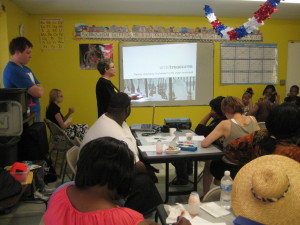Study: ‘Excessive’ wireless taxes hurt poor families

Josh Peterson | Watchdog.org
WASHINGTON, D.C. — High state and local taxes on wireless services could disproportionately burden poor adults as cities and states look for new and increased revenues, say researchers.
A community gathering on June 19, 2009 at a housing project on the South Side of Chicago. A recent study by the Tax Foundation found that excessive wireless taxes would disproportionately burden poor Americans.
According to a recent study published by the Tax Foundation, tax hikes on monthly cell phone bills, like Chicago’s recent increase on a wireless tax for 911 services, negatively impacts poor families. Mayor Rahm Emanuel’s office reportedly lobbied for the increase.
“With state and local governments continuing to face revenue challenges, the wireless industry and its customers continue to be at risk as an attractive target for raising new revenues as demonstrated by the targeting of wireless customers by the city of Chicago in 2014,” said the study.
Chicago wireless customers, according to the Tax Foundation’s study, pay the highest in taxes on monthly cell phone bills: 35.42 percent — not a small fee for the city’s poorest residents, which includes minorities.
Wireless services have become an increasingly important part of American life, including those living below the poverty line. For example, the Centers for Disease Control found that at the end of 2013, 56 percent of poor adults didn’t have a permanent landline, and paid for wireless services only.
The U.S. Census Bureau reported in September the U.S. poverty rate in 2013 was 14.5 percent — just over 46 million Americans. An American family of four living off of no more than $23,624 per year, less than half of the median household income, was considered to be in poverty.
CBS Local reported in April the 60 percent of residents in the south and west sides of Chicago fell below the poverty line.
Philadelphia, which ranked eighth in the Tax Foundation study, reportedly ranked in 2013 as the poorest big city in the nation, with a 26.3 percent poverty rate, and 12.2 percent of its residents living in deep poverty — an income level below half of the poverty threshold.
According to the Tax Foundation study, Philadelphia taxes residents 22.38 percent for wireless services, meaning that for a $100 monthly 4-line wireless plan, the city would add an additional $22.38 per month to the bill.
Watchdog.org previously reported in February that 84 percent of U.S. consumers, according to a survey conducted by McLaughlin & Associates and Penn Schoen Berland, thought their combined state and local wireless taxes were too high. Fifty-four percent thought the tax rate on their monthly cell phone bill should be lower than 7 percent.
“Accessing content on our phones these days is easier than ever before, but paying cell phone bills remains difficult for many,” said Joseph Henchman, Tax Foundation vice president of legal and state projects, in a press statement.
“Instead of singling out wireless services with stealth tax increases, state and local governments should seek more neutral and less disruptive sources of revenue,” Henchman said.
Contact Josh Peterson at jpeterson@watchdog.org. Follow Josh on Twitter at @jdpeterson







